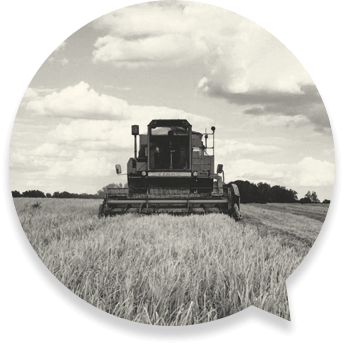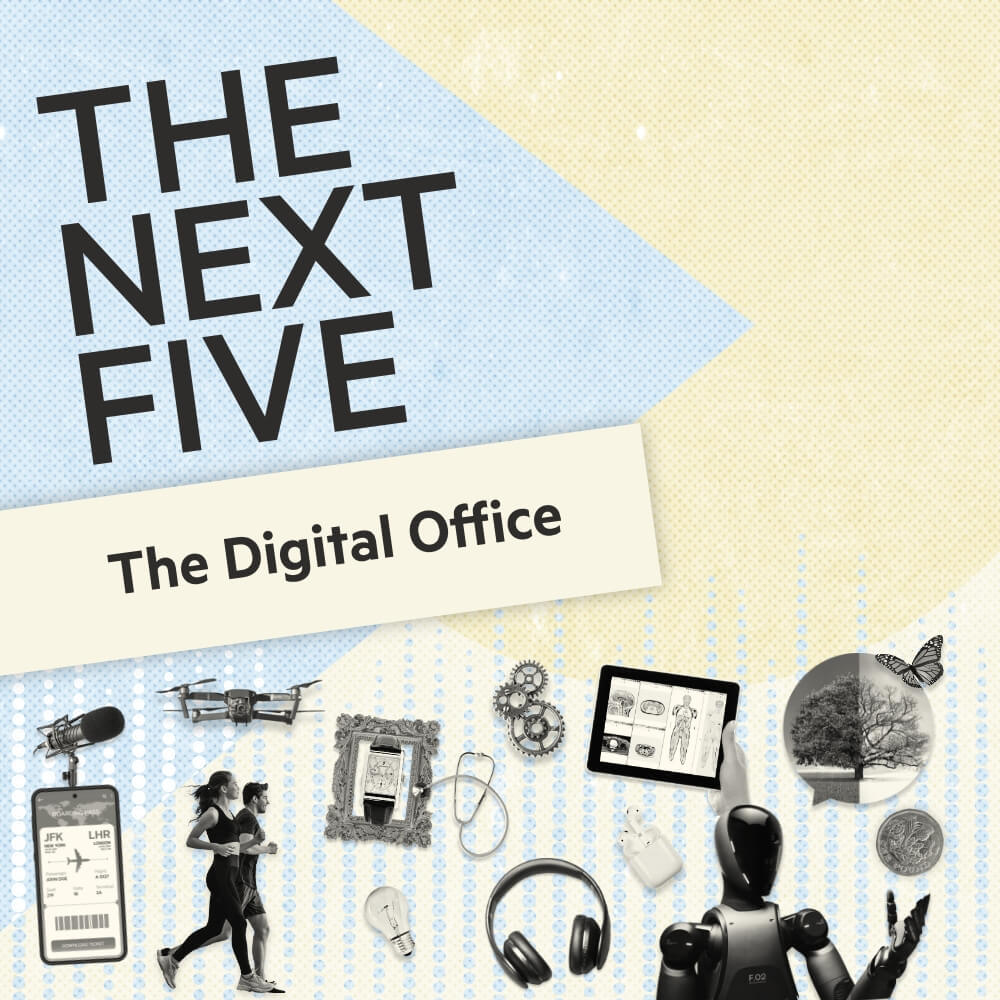THE NEXT FIVE
THE NEXT FIVE - EPISODE 10
How Automation and AI will change humanity
Financing Net Zero: Listen to Chief Economists and Investors tackle the net zero cash flow issue






































The Next Five is the FT’s partner-supported podcast, exploring the future of industries through expert insights and thought-provoking discussions with host, Tom Parker. Each episode brings together leading voices to analyse the trends, innovations, challenges and opportunities shaping the next five years in business, geo politics, technology, health and lifestyle.
















Featured in this episode:
Tom Parker
Executive Producer & Presenter
Steve Wood
SVP of Product and Platform at Slack
Nathalie Nahai
International speaker and best-selling author
Gerd Leonhard
Futurist, humanist and CEO of the Futures Agency
Advancements in technology to date and the pace of change in the future is far beyond the evolutionary speed of human development.
We are building smart cities, smart homes, smart offices but now we, the people, need to be smarter in using technology. How tech is built and how we use it as humans has never been more important. In this episode of The Next Five, we look at the relationship between technology and us, how our automated future and the interactions we have with tools, including AI, will shape humanity. Steve Wood, SVP of Product and Platform at Slack, joins us to show how we can empower people with tech. Nathalie Nahai, international speaker and best-selling author, discusses the need to foster better human connections and relationships with others during this fast paced technological future. Gerd Leonhard, futurist, humanist and CEO of the Futures Agency, extols the virtues of machines that remain competent and don't become conscious.
Our sources for the show: FT Resources, CIPD, OECD, Oxford University, Goldman Sachs, Alvin Toffler, HNet, The Dictator.
This content is paid for by Slack and is produced in partnership with the Financial Times' Commercial Department.
READ TRANSCRIPT
- Tech
Transcript
How Automation and AI will change humanity
Soundbites:
TOM: 00:07
Advancements in technology to date and the pace of change in the future is far beyond the evolutionary speed of human development.
Gerd: 12:04 I don't want machines to be conscious, I want them to be competent.
TOM: 00:16 We are building smart cities, smart homes, smart offices but now we, the people, need to be smarter in using technology.
Nathalie: 12:20 how can we actually tell when this technology is being used against us without us knowing.
TOM: 00:27 How tech is built and how we use it as humans has never been more important.
Steve: 04:28 I think, perhaps counter intuitively, machine learning may bring more humanity to work,
TOM:
I'm Tom Parker, and welcome to the next five podcast brought to you by the FT partner studio. In this series, we ask industry experts about how their world will change in the next five years, and the impact it will have on our day to day. In this episode, we will explore technology and us, how our automated future and the interactions we have with tools, including AI, will shape humanity.
Music Fade
TOM: Industrialisation, where machines first started to take over human tasks, has led many experts to discuss the relationship between man and machine. The industrial revolution of the 18th & 19th century shifted labour systems from fieldwork to factory work. The initial fear of job losses made way for an increase in employment opportunities as machines required operators and operators required managers. Wages in factories were higher than farmers’ incomes.
Automation, facilitated by artificial intelligence, is destined to have a major impact on jobs, and the workforce. This new relationship between man and machine will reshape the labour force, the way we work and our very connection with our employers and colleagues. But, by how much?
Perhaps not as much as some first thought. 02:00 10 years ago in 2013, an Oxford University study predicted that 47% of jobs would be lost to automation over the next two decades. But just 2 years ago in 2021 the OECD submitted that 14% of jobs are at high risk of automation and recently, a March 2023 report by Goldman Sachs suggested that roughly 9% of the global labour force today could be disrupted by AI, the equivalent of 300 million jobs. So the estimates are shrinking as the tech evolves but it’s still destined to have an impact.
Gerd Leonhard
I think there will be about two hundred million jobs impacted by artificial intelligence and automation, some less than others.
TOM: This is Gerd Leonhard, futurist, humanist and CEO of the futures agency.
I wouldn't say that 200 million jobs are eradicated, but seriously impacted. Like you're not if you're a paralegal, I mean, what do you do as a paralegal you research you check facts, you make recommendations to the lawyers? Okay, well, that's an AI job, unless it's a question of judgement, like criminal lawsuits. But if I'm going to check the real estate records, and what sold for water and you know, whatever, you know, that's an AI job. It's about logic and rules, anything not not rules, paralegal has to do. So I use the same pyramid as Maslow Pyramid, where on the bottom, we have data, information, and basic knowledge. That's becoming machine territory. Right? A robot can build a bridge, and the robot can print a house, a robot can also figure out where to print it and what material to use and what to order. So what we have to do is we have to say, Okay, so a good engineer should be an engineer that is above the AI level, which is not that difficult right now, but eventually becomes more difficult. And we need to train our future workers to have more human character, more human traits, so that they can have things like judgement and understanding and complexity and to deal with the Bolkiah. And, you know, agility and resilience is really important.
Steve Wood
I don't think it's about losing jobs or anything, it's about work going away. I think it is about work evolving.
TOM: This is Steve Wood, SVP of Product and Platform at Slack
And I'd hope that it actually results in empowering more people to do things that previously were maybe inaccessible.
where technology evolves, people's work in terms of empowering more people to kind of rise up and kind of do more effective work. And adapt in the working life that certain things go away. But other things enter. I would be hard pressed in my world to say if I said to my colleagues, do you need more creative time to think more about where we should go? To understand where we should be placing Bigger Bolder bets on the future roadmap of slack? Would you appreciate more time to do that, so that we could collaborate more effectively with each other to drive transparency between each other to make sure that we're all aligned, we know what's happening. I said, Do you need more time to do that? Can I give you more time to do that? I know for a fact every one of my colleagues and say please, yes, please, yes, give me more time to do that. If you can take more of this work away from me. And let me work more in the creative space more in the collaboration space, the more human side of transparency and alignment, we could drive far faster. So that's not getting people out of work. It's just changing the calibre of work and the collaboration of work. And I think perhaps counter intuitively, machine learning may bring more humanity to work, rather than taking it away.
TOM: That’s a good point about it bringing more humanity to work. AI can't quite crack the code on Social Intelligence traits, such as caring and persuasion, or foster creative intelligence that in people is built through the nature and nurture of human development. Is it possible to create a work environment that harnesses the productivity gains of automation and AI but without losing connection or engagement amongst employees?
Nathalie
Well, I think for any kind of meaningful connection and engagement to be possible, certain things have to be in place.
TOM: This is Nathalie Nahai , international speaker, best-selling author of Webs Of Influence and Business Unusual, and host of The Hive Podcast
So things like psychological safety, the sense that you are not in immediate jeopardy, that if you voice unpopular opinions, you'll have the space to be heard. You won't be penalised for voicing concerns, I think also, there's another element around security, which when you're living through a period of rapid change, not just in technology, but also issues around, you know, energy resources, geopolitical disturbance, etc. Biodiversity loss, there's a lot of uncertainty around so how, as organisations, can you foster a culture in which not only is there psychological safety, there's also a sense of security so that people feel free enough to do their most creative work. And I think that's the area where AI has yet to kind of encroach upon the creative space where we can generate ideas. And so I think there has to be a cultural context in which those things are made possible. And that means reducing fear, increasing the possibility for innovation, creativity, and rapport.
And so I think if we're talking about any kind of transformation, and empathy led digital transformation, you have to first think about what are the biggest challenges that stand in our way of being more empathetic towards others, and those are social and their culture. And then what are the things within social and cultural structures? And again, technology comes into this with social media that exacerbate rather than reduce conflict and therefore create a situation in which empathy is quite hard to come by. And then how can we use digital tools to reduce some of those impacts, and create spaces in which people can actually come together and feel like they have a voice and come to a sort of a mental and emotional space where they can have vulnerable conversations be heard and be witnessed with discomfort without feeling like they are? At real risk, and in real threat, So I think that has to be at the heart of any transformation that happens. How can we use all of the tools available to us to create a more nourishing environment in which to deal with difficult issues?
Tom: Steve, what’s your take? How do we empower people with technology?
STEVE: 00:36
It's a great question, actually, it's been a huge part of my career empowering people with tech.
I think it starts with meeting people where they work. And that's, that's the key for sure. I think it also involves people in some regards self-selecting the tools that they find most productive. I know that that can be harder in larger environments, but tools that they engage with on a regular basis to kind of help them do the work.
And I think if you can empower people to bring their creative endeavours into software to not be using software, but actually leveraging and automating it to kind of get the tools to work the way they do. I think that's hugely empowering. So how you do that as obviously meeting them how they work, building tools are simpler and easier to use. So that's, that's kind of how we see the empowerment side, it's obviously a challenge to kind of empower people with tools. We're seeing a huge surge, and things like automation and intelligence are changing the trajectory of that engagement.
actually have this report, the state of work report that slack does all the time. just to kind of get a sense of the pulse of the industry. And one of the things that came out was, when people use AI, for example, they feel that they report some 90% higher levels of productivity, which I think is kind of interesting.
Steve Wood
And I do think there are certain points in the history of technology where there's these inflection points. And I think we're at one of those now, and I think that that inflection point is really making software more human. And I think we do now have the tools to make technology more human.
So it's a new New Age, it'll be interesting to see how people adapt to bring this technology. And I do think that that the with the today level of intelligence, I see technology as like kind of copilot in how you work, that it's helping you understand problems and problem spaces better, but I don't see it as this kind of creative intelligence or that kind of that it's actually really thinking it's more just kind of Mining and bringing you that information in a way that is human.
TOM 03:51
Alvin Toffler, Author of Future Shock, published in 1970 said “The illiterate of the 21st century will not be those who cannot read and write, but those who cannot learn, unlearn, and relearn.”
Reskilling employees enough to satisfy the surge in demand for new technologies in the workplace is paramount; lacking the necessary skills will slow down the shift to a digital economy. The UK’s CIPD 2023 quarterly labour market outlook, showed that 57% of employers had hard to fill vacancies; 40% of them were skill shortage vacancies.
So how do we better learn, unlearn and relearn in line with our rapid technological advancements?
Gerd Leonhard
Well, it is quite clear, everybody has to be deep in technology, understand technology, learn technology, that doesn't mean you have to know how to program. I mean, I can speak to my wristwatch and will program for me now. Not very well, but it will just be that I can order a car. So being good and being technology friendly is an absolute must. But having said that, you know, STEM science, technology, engineering, math, is not the ticket to our future. It is just, it is something that we keep doing and something that we want to have everywhere, but really is the human part that machines can do. That is our ticket to the future. So foresight, imagination, collaboration, compromise, empathy, narrative, compassion, you know, all of these things.
So businesses now have to awaken these human parts, rather than people that acted like robots. And it's totally clear, if you work like a robot, a robot will take your job. If you learn like a robot, you will never have a job. Or you end up working for a robot. So this is painful, literally as our education has to change. Our Adult Education has to change to give people the sense of value and creativity that we all have but lost,
We really do have to focus on what makes us human, because that is what makes us different from machines. I think Peter Drucker said something very similar once about strategy. I always say culture eats technology for breakfast. You know, a company's success is about culture. It's not about, you know, technology that commoditizes, it's about culture.
Tom: 04:44
The invention of the printing press in the late 15th century made possible the widespread preservation of knowledge and increased access to information for readers. Elizabeth Einstein argued that this technological advancement changed western society at large, by forcing a fundamental shift in mentality, communication and collective memory. Nathalie, is there another way of looking at this reskilling? What about societal change?
Nathalie Nahai 30:25
I think again, it's this idea of starting with the end in mind, which is what are the things that you most need help with? So for instance, the great examples that lots of people cite medical breakthroughs, wonderful, why not crunch numbers and figure out extraordinary ways of healing people that are based on virtual models so you're not having to test on people or animals, that there's so much potential for using technology in a way that really does route itself in empathy.But then I think if we're going to be creating solutions that reduce the amount of work that humans need to put in, in order to get amazing outcomes, you don't need as many workers. So then what are you going to do with people? And how do you live a good life, so this idea of eudaimonic, happiness, you know, their sense of having a life of dignity, of integrity flourishing. And when we think about that one of the people whose work I really like a psychologist called Carol de RIF, actually came up with a framework back in the late 1980s, around eudaimonic happiness, which plugs into this perfectly, she talks about our desire for autonomy, to be in the driving seat of our lives, to have positive relationships with others, to be able to have some control or mastery of your environment to be able to choose how you live, for instance, personal growth, purpose and self acceptance like these are pillars of a thriving life. And so I think, if we can orient ourselves around frameworks that we already know, based on decades of research in the humanities and psychological sciences, then that's going to help us much more accurately decide when technological advancements and integrations are going to lead us more in that direction or less. But that supposing Of course, that we're orienting ourselves not just for maximum profit, but for maximal flourishing.
TOM: AI can mine data at eye watering speeds, the benefits of this if used correctly are abundant. But it can use this data to analyse human behaviour, predict what we will do and even find weaknesses in our decision making. How much can AI manipulate human behaviour and how do we need to prepare for this?
Gerd Leonhard
Well, I think we're very, very close to AI being able to simulate pretty much anything that we show it,
Whether it's our facial muscles and robots, the way that we talk, how we interact, language images, simulations are getting very, very good. And that is a scary part because it's utterly confusing for us. I think Demis Hassabis once said about AI, that AI is defined as information and data turned into knowledge. Okay, and what we have now is editing data and information turns into content. And that is amazing and definitely a great crutch and tool for us. But if AI will start telling the narrative to us, you know, the narrative of the world, our stories, our news, our politics, you know, that is not a good thing. Because it is fabricated. It is. It's just about logic and patterns. And so this is one of the fundamental challenges that we have to understand how we delineate what's real and what's not real. And that is the short term problem with AI is exactly this kind of reductionism.
TOM: Nathalie, your thoughts?
Nathalie Nahai
Oh, with that I had a crystal ball.
So I think there's lots of different ways in which AI can manipulate human behaviour. So if we think back all the way back to the 1960s, when an MIT lab, the first Rosarian psychoanalyst, was created by a pseudo psychoanalyst program, called Eliza. And it was basically a very simple model, which would feed back based on the input that it received phrases. So if someone said, I'm feeling quite depressed, this little program would say, Oh, how long have you been feeling depressed? Tell me more. What do you feel about the connection between x and y. So there's kind of we've always had, we've always had this tendency to anthropomorphize and if we feel that we're listened to or heard, even if it's just very rudimentary mirroring, or mimicking of language, our tendency is to experience a sense of rapport and attachment, even in the most basic way. So we're already at risk from the get go, we're at risk. And then if you bring into the mix, voice cloning, compelling, high quality, deep fakes the ability to create, you know, an interesting piece of narrative that can then get fed to a system that then repeats it in a convincing way, which you've seen all these voice scams in recent recent times. The question very quickly becomes, how can we actually tell when this technology is being used against us without us knowing.
TOM: So what does the next five years look like? What do you want to see happen?
Steve?
Steve Wood
Yeah, for sure. So that's five years, obviously hard to say nobody predicted a lot of the things that we would see. But I think in an industry, you often see these inflection points. I think the last big one we had was with the iPhone. And for a developer, it became a very exciting nexus of tools and technology and processes. It was an incredible thing for human creativity to really unlock this whole set of new use cases, and I think we're there now, again, and I think what's coming together now is the ability to integrate with tools to bring in the tools that you use that make you productive in your work. It's the ability to automate those tools and ways that are unique and accessible and available to you. And then I think that with machine learning and AI is going to change how we experience technology and I think it is going to make it more human and more accessible. I don't think we could do that before. So, you know, I think we will look back five years from now and make statements like, Well, do you remember we used to, like, had these databases and we type stuff into fields, and then we'd hit submit, and it would save the record. And that's kind of how we worked. That's kind of crazy, wasn't it? Now we just kind of work like a human, we just write things down that we care about are important. And the systems through integration and automation, and machine learning and AI, figure out how that data needs to be preserved and remembered, then how it needs to be reflected back to us when we need it. I think that will make technology far more human and accessible than it's ever been. We should use our time now to think much more creatively. We should use our time now to look at these technologies and ask a lot of very fundamental questions, given that technology can now help us organise, collate, preserve, save, integrate, automate, all that kind of stuff, the knowledge that is most important to how we work, how can we re experience how we work with technologies and tools? How can we experience how we engage with those tools, in the same way that we did with the iPhone. So I think it's a super exciting time. So I don't know what the five year outlook will actually be. But I'm certainly very optimistic that it's going to be far more human, which I think might be the opposite of hell. A lot of people are starting to feel that machine learning is scary. But actually, I think it will herald in a more human way to work with technology and tools. I think I will feel far more instructed, or feel far more knowledgeable and informed about what's happening.So I'm very excited about the future. I think the next five years is gonna be a tremendous explosion of innovation. So we'll see where it goes.
TOM: Nathalie
Nathalie Nahai 49:15
So I think there's going to be a huge amount of disruption, it seems as though we're making decisions in technology, many of which are resource intensive that have huge social and environmental impact, as if we're going to just keep having access to the same energy we're not. Minerals are finite energy and finite prices of fuel are going up. Renewables are a great option, but they're certainly not going to be able to sustain our current energy usage. And so I think there's some interesting questions around, around what happens when scarcity is factored into the models of growth and technological advancement, that we haven't yet taken into consideration.
Nathalie 50:55
I think there's also something around the ways in which different parts of the world are going to respond to technological advancements. So for instance, with the EU, making decisions around AI regulation, kind of connected to GDPR. And being almost one of the Golden standards against which other nations are perhaps judged, like the US or Russia or China, I think we're also going to see a shift, a drifting apart between some of these geopolitical regions, in terms of what AI is permitted to do within certain territories. And I think that's going to be super interesting, because it means it's going to have an impact on what kind of innovation is permitted. What are the lived experiences of people within those societies, things like facial recognition being rolled out, social credit score systems, surveillance, capitalism, you know, the disappearance of cash, and what that means for, you know, autonomy. And so there's just so much that's entangled with the digitization of everything, and the scoring of everything that I think is going to have a lot of consequences that we haven't really thought about yet. What I would like to see as the opportunity for us to think more deeply, think more slowly, more critically. And couple that with not just an awareness of our kind of internal emotional Weber as it changes. But what are our deepest longings? What do we longed for in this life, when we reach our deaths wherever, and whenever they might be, you know, where we think to ourselves, Well, I lived as fully as I could. There's a beautiful quote that I really love by Michael Mead. And he says, whether we know it or not, our lives are acts of imagination. And the world is continually reimagined through us. And I think we have the opportunity to really reimagine who we want to be in collaboration with technology and with a living world.
TOM: And finally, Gerd?
GERD so, next five years total change. basically in technology. Everything that was science fiction is becoming science fact. Speaking to machines, working with machines, 3d printing of organs, quantum computing, nuclear fusion we're about five years away from AI becoming so capable in simulation, that there's no way for us to know the difference. That includes Rob robots, humanoid robots, that we can probably tell in five years, but if it doesn't have a body, I don't think we could tell in five years what it is. So that becomes a real issue as to how to delineate this. And I always say that we should, we should not be striving for artificial general intelligence as as a goal of companies or science, because that is a suicidal goal. It's also utterly pointless, because I don't want machines to be conscious, I want them to be competent. Just get the work done. If a machine can make me work, you know, three or four hours a day left of work for the same money for me that I'd be happy man, I don't want the machine to think and to create and to make meaning.
Gerd Leonhard
What do I want to see happen? First, I think I would like to see complete commitment from technology companies to create a good future, not just a rich future. And for us to have a conversation about quantum AI and so on, about how they can contribute to the greater good. So I would like to develop a global consciousness. I think we need a council, especially on AI. Maybe even a council with executive power. That creates binding agreements, like we have a nuclear, you know, they're binding, but people break the man. Okay. But you know, so far it has worked out. And lastly, I think most importantly, I think about all of this, we need to have a better narrative of what the future is, you know, the future isn't going to be just bad and difficult, that the future is better than we think. And Kevin Kelley says, there's a lot to like, it's not that we have less problems, but we have more capacity to solve them. I mean, we have at our disposal, huge scientific and technological advancements. But we're too stupid to get together to actually use them. Right. So yeah, we could have a green economy now. But you know, we were paying 6 trillion a year to fossil fuel subsidies. Because you know, that's what it has always been. So we need to make a better narrative about the future, that it can be good. There's two things one is that humans can do the right thing given the right circumstances, and that we can actually solve things once we realise what they are, and be the more intelligent being entity rolls over the ones less intelligent. And so those are two things that make me hopeful as long as we can maintain our positioning as being both compassionate and collaborative and intelligent. That gives me great hope that we can achieve something that's really amazing.
TOM OUTRO: 07:55
In 1940, Charlie Chaplin, in one of his few speaking roles said in a speech from The Great Dictator,
“We think too much and feel too little. More than machinery we need humanity…Let us fight for a world of reason, a world where science and progress will lead to all men’s happiness.”
Automating key tasks could eradicate the more tedious aspects of our jobs and allow human employees to focus on more meaningful, fulfilling tasks. Tech might take your job in the future if it is based on tasks that are repetitive and easily learnt by machines. But we won’t be without jobs; they may just look and feel different. Our lives will feel different.
Luckily for us there are those out there thinking and feeling their way through the complex and lightning evolution of technology. Whether you’re Steve at Slack, working out how to empower people with tech, where it serves as a (digital assistant or) co-pilot that will bring more humanity to work, or Nathalie who hopes for a eudemonic future, where technological advancements fosters better connections and relationships with others. And finally Gerd who is also striving for the good life of compassion and collaboration where machines are competent not conscious. All are aware that we’re at an inflection point. We get to decide the future. Hopefully one where technology is technology and how we, the people, will remain just that, people.







